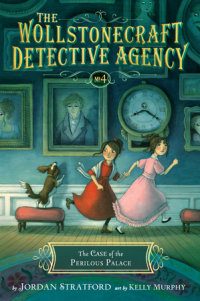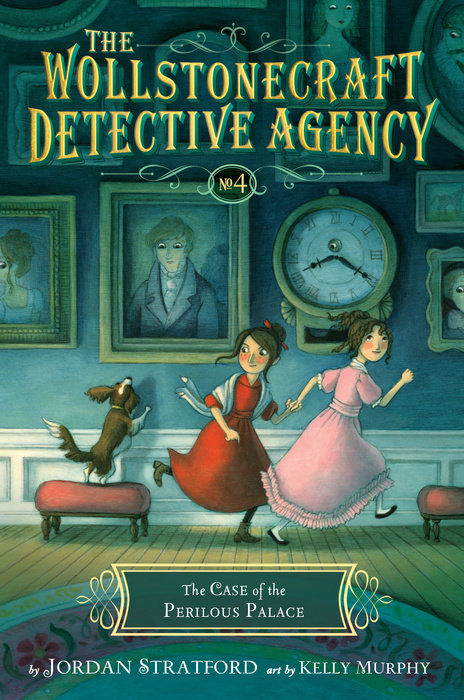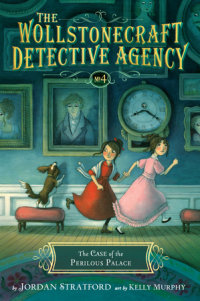The Case of the Perilous Palace (The Wollstonecraft Detective Agency, Book 4)
The Case of the Perilous Palace (The Wollstonecraft Detective Agency, Book 4) is a part of the The Wollstonecraft Detective Agency collection.
The history-mystery-science series continues as the Wollstonecraft Detectives--Ada Byron Lovelace and Mary Shelley--take on a case by royal request.
Ada's imperious grandmother has absolutely shut the Wollstonecraft Detective Agency down--until they get a case from a princess, that is.
The princess Alexandrina Victoria, age 9 (who will grow up to be Queeen Victoria), is the most closely watched girl in England. She is never alone. Every morsel she eats is catalogued. Every visitor overseen. Every move noted down. She has but one thing of her own--a sketchbook she uses as a secret diary, where she records her private thoughts in code. But now, somehow, that sketchbook has disappeared.
And so the princess enlists Ada and Mary to figure out what has happened to the sketchbook without arousing the suspicions of her minders. A most clandestine case indeed! One that will involve breaking into Kensington Palace and uncovering a host of surprising royal secrets...
This funny, Christmas-time romp of a caper will delight history and mystery fans alike.
An Excerpt fromThe Case of the Perilous Palace (The Wollstonecraft Detective Agency, Book 4)
The click of Ada’s door punctuated the end of one sentence and the beginning of another.
The first was a sentence from Gran and came at the end of a long tirade. Ada had missed most of it, noting only that it concerned Ada’s having set off a bomb in the house, which was mostly but not entirely true. The bomb had not been a real bomb but merely a counterfeit, smoke-producing bomb, which she had to admit was bomblike enough to be convincing, which was rather the point.
The counterfeit bomb had done its job and cleared the house of Ada’s enemies. Her archnemesis, Nora Radel, had mesmerized an alarming number of the household servants, and they had been advancing menacingly when Ada broke the spell and sent them fleeing with a bit of a bang, a lot of smoke, and a cry of “fire!”
The commotion had also sent Gran running from the house, which had seemed like a bonus at the time. But now Gran was back. And she was not impressed with the way Ada had successfully wrapped up her last case. She was not impressed with the Wollstonecraft Detective Agency. Not impressed with Ada’s friends, her room, her dress, her anything . . .
The final word of the final sentence of Gran’s tirade was “precisely.”
“Precisely?” Ada asked, tuning back in, but unclear on what she was meant to be precise about.
“I shall not repeat myself,” Gran said with finality, her snotty pug tucked firmly into her armpit.
“You probably should,” Ada suggested, only realizing how cheeky that sounded after she’d said it.
And so Gran did. At length. Using words like “unsuitable,” “banished,” and “forbidden.” And Ada still wasn’t sure of much except that all the people she had grown to know or love or care about were being brushed away like crumbs from the arm of a chair. And now even Gran herself was gone, not from the house, but from Ada’s avalanche of a bedroom.
With the clicking of the door, a second sentence had begun. This sentence being a kind of imprisonment to which Ada was to be subjected.
Gone—no, banished—was Ada’s dearest friend and co-founder of the Wollstonecraft Detective Agency, Mary Godwin, along with Mary’s stepsister, Jane. No word was spoken of Ada’s half sister, Allegra, because Gran hadn’t known she was even there. But if she had known, Allegra would have been banished too. Along with Peebs, her tutor and ally. Anna, Ada’s maid, whose name she had only known for a few months, was also dismissed, despite her many years of service.
Ada bundled up the velvet of her gown in little balls in her hot fists and ordered herself not to cry.
The results of this attempt were variable.
“What do we have.”
It was not a question, and indeed Ada had no one to ask. The not-a-question was spoken aloud in Ada’s disastrous bedroom, which contained sliding piles of books and notes and drawings, tools stained with oil, gears, springs, spindles, and several small jam jars full of dirt, which needed to be sorted. Geographically.
Ada sighed. What the room did not contain was Mary. If Mary were here, Mary could make sense of everything. Or at least ask the sort of questions that would lead to Ada’s making sense of everything, which made Mary happy, which made Ada happy. The lack of Mary resulted in a general unhappiness that clung to the damp room like a chill.
The fire had gone out. Of course. Because Anna, tender of fires, was gone.
Ada decided she needed options, and time to think. Her room wasn’t perfect for this. It didn’t have either her bleh—her mechanical computer—or enough books in it. Taking a look around, Ada admitted that her room probably had the same number of books as the library, but they weren’t the right books to solve the problem at hand.
Whatever that was, precisely. She hadn’t gotten that far yet.
The library, then.
Ada dared a tiptoe over to her door and turned the knob as silently as she could manage. Peeking out, she spied a footman, stationed just outside her door, preventing any sort of escape—even to the library.
How to get a footman out of the hallway? Ada had very little experience with such things. She knew her way around her butler, the very tall and entirely silent Mr. Franklin. And she’d recently begun to get the hang of maids. The less said about cooks the better, the last one having been under the uncanny influence of a master criminal. It was too much to think about, or at least the wrong time for thinking about it.
She sighed, and returned her attention to her escape.
What little she had observed about her grandmother’s footmen was that they were constantly fetching things, and seemed particularly animated after a door-knocking. But how to knock on the door? The windows of Ada’s room looked out the back of the house, so it was not as if she could tie a large wrench to a knotted bedsheet and dangle it out the window, in hopes that a good swing could make contact with the front door. No, she’d need to arc the bedsheet straight up and over the roof, hopefully not smashing out any windows in the process.


